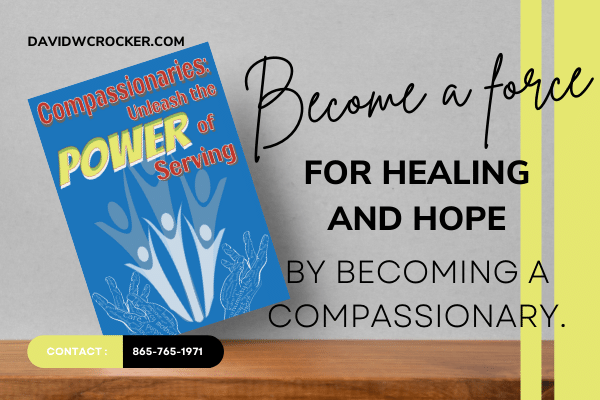Compassionaries, the Book

Have you ever thought about writing a book? If not, don’t . . . unless you want to put yourself through the wringer. It’s a long, arduous process. If you have, it’s probably because you want people to know about one or more of your life experiences from which they might benefit. Or, and this is more likely the case, you have a message you want to share.
This is why I wrote Compassionaries: Unleash the Power of Serving last year. (officially released March 22, 2022.) It dawned on me that God had led me on a long journey having to do with serving people in need and I need to share what I have learned. The more I wrote, the stronger I felt about proclaiming the priority of serving. And the stronger I felt, the more passionate I became. So this message has become a burning in my bones. For that reason (and because the book is now available), I want to expound on that message in this blog. I have mentioned the book before; now is the time to tell you more.
Going deeper with serving
While I have been involved in serving people in need for almost 30 years, I have to admit that I did not know the finer points of serving. It occurred to me the same is probably true for others who have be involved in serving others. I wanted to fix that, so I dug deeply into the subject and now have a better understanding than ever.
I have observed through the years the better a person’s understanding is of what he does, the better he does it. How many times have you gotten involved in serving others without much thought to why it makes you feel good to serve or how the people you serve might feel about it or how to navigate through some of the challenges that surface in the process of serving others? I set out to find answers to these questions and include them in the book to help other servants.
If reading Compassionaries stimulates readers’ reflections about her own experiences of serving, then I will have done what I set out to do. I encourage anyone who serves others to spend a little time reflecting on that experience. Some questions you may ask yourself are:
- Did treat the person(s) I served with dignity and respect?
- Did I listen to the person(s) I served to learn about other needs they had?
- Did I serve out of the right motive?
- What did I learn from this experience that will make me a better servant going forward?
- Did I make sure the person(s) I served know God loves them?
For believers AND unbelievers
Compassionaries is written from a faith perspective. However, as I state in the Introduction, I tried to write in a way that people who come to serving from another perspective (i.e. to “give back”) will not be put off by biblical references or faith talk. Ideally, some of these will explore what Jesus said and did pertaining to serving others beyond what is in the book and begin their own relationship with him.
On that point I want to affirm cases of serving others outside the church or outside Christian reasons for doing so. To denigrate “non-faith-based” serving as second rate is to be a religious snob. These cases are valid and good. On the other hand, serving others as the “hands and feet of Jesus” takes into account persons’ spiritual needs as well as material needs. Also, when we serve we need to give credit where credit is due–to God.
The power of serving
Several months ago I wrote a blog about the power of serving—Serving Is Quiet Power. I mention it here because the discovery of the power of serving is what happened during the writing of the book. I became so convinced that serving is one of the most powerful change agents around that it became the subtitle of the book.
Most people agree that serving others is a nice thing to do but they wonder if it really makes any difference. I am certain serving is atomic which is to say it is rarely noticed (like an atom) but has incredible power (like an atom when it is split in the process of nuclear fission). And here’s the best part—serving is power that is available to everyone. One of my favorite quotes by Martin Luther King, Jr. says it better than I can:
“Everyone can be great because everyone can serve. You don’t have to have a college degree to serve. You don’t have to make your subject and verb agree to serve. You only need a heart full of grace . . . a soul generated by love.”
Finding your sweet spot
My hope is some people who have rarely served others will be moved to do so after reading the book. It made my day when a recent reader said after reading the book she was going “to double down on serving.” I included in the book steps I have found are helpful in putting folk on a solid journey of serving. I have also included in the book resources which can be helpful for anyone looking to find a place to serve that fits him.
Your “sweet spot” is not necessarily the one thing you can do to serve others. Most everyone is able to serve in a variety of settings and circumstances. However, you may feel more comfortable in one setting than most others. This process includes the mandates of God to serve others, the needs of people in your community, and your capacity to serve. See Chapter 11.
How to get the book
At this point in my blogs, I ask for responses to the blog from readers but this time I want to let you know how you can get a copy of Compassionaries. Go to the website created to support the book—davidwcrocker.com—and go to the “purchase” page. A copy will be shipped within 2 days of receipt of your order. I am offering a discount of 20% for bulk orders of 10 or more copies. You will also see a downloadable Study Guide on the website as well as a way to request a speaking engagement.



Leave a Reply